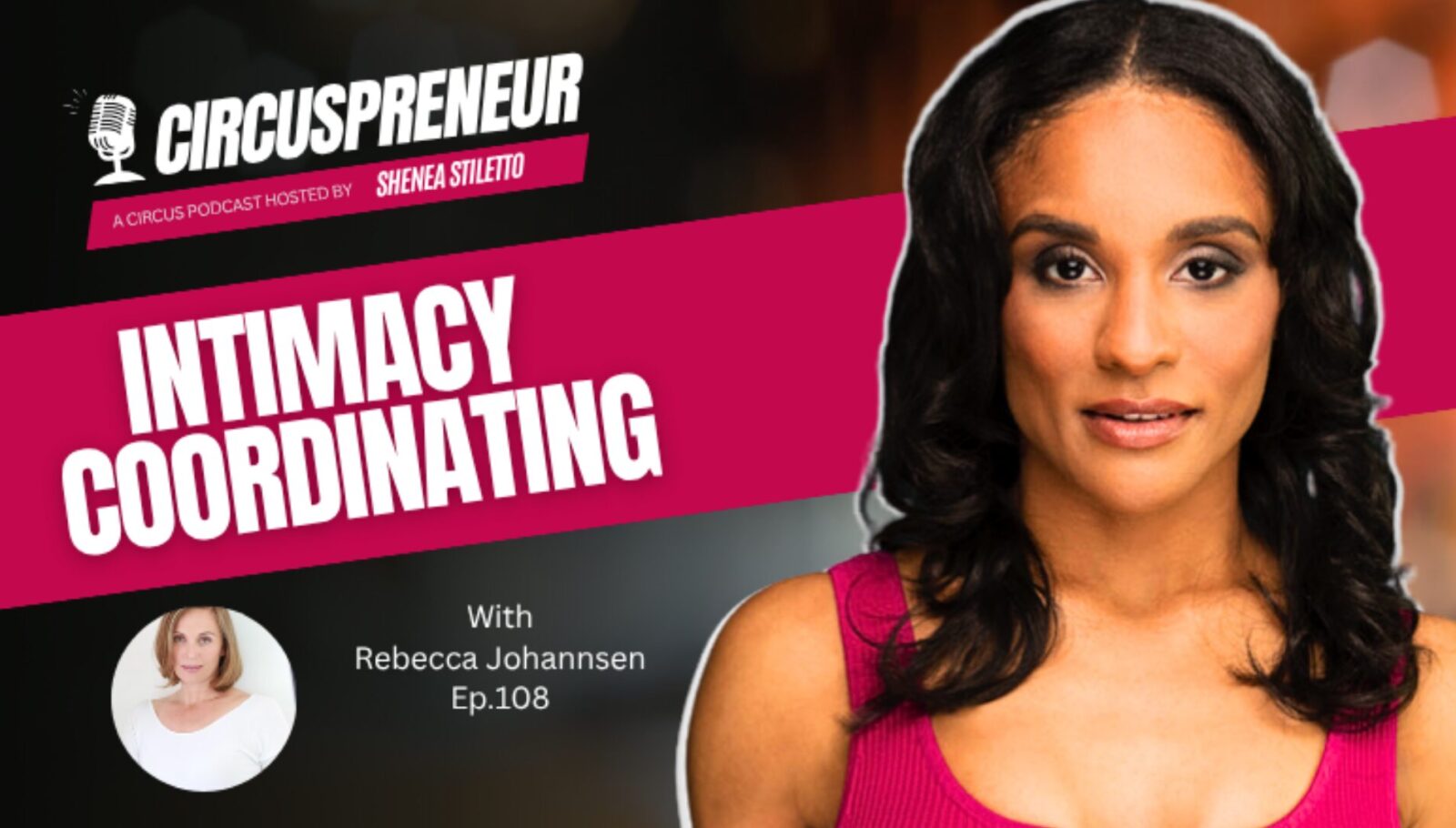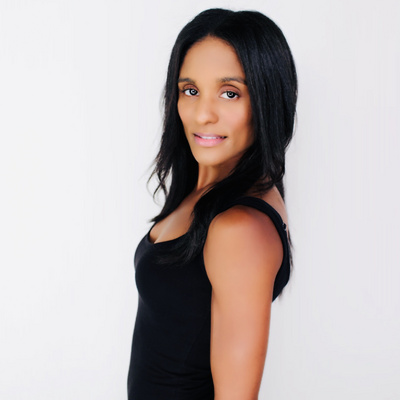Rebecca Johannsen: Intimacy in Modern Circus

On this episode of the Circuspreneur Podcast, host Shenea Stiletto interviews Rebecca Johannsen who is an Intimacy Coordinator and educator specializing in performer safety, consent, and communication across live and filmed entertainment — including circus, theatre, and dance.
With a Ph.D. in theatre and decades of experience as a producer, director, and performer, Rebecca brings a collaborative and trauma-informed approach to creating safer rehearsal and performance spaces.
She leads the Intimacy Choreography for Live Performance certification program through the Intimacy Professionals Association and has become a trusted advocate for artists working in high-risk and movement-based disciplines. Her work bridges the worlds of performance, psychology, and education — ensuring that creative expression and performer well-being go hand in hand.
How did intimacy coordinating evolve into a recognized, unionized profession—especially in film and television?
Rebecca Johannsen:
Intimacy coordination as we know it today actually started in live performance, where artists began advocating for better language, structure, and consent-forward practices for intimate touch. When the Me Too movement exposed systemic abuses in film and TV, major studios realized the financial and ethical necessity of safer sets. Around 2017, the first intimacy coordinators were hired in film—a shocking recent development.
Because film production is now heavily corporatized and risk-averse, hiring intimacy coordinators quickly became standard. It’s far cheaper to hire someone trained in consent and safety than to settle a harassment lawsuit.
Rebecca trained in 2020, just as the field was expanding. Early on, very few intimacy coordinators existed, which allowed them to stand united on rates, conditions, and minimum standards. They used the stunt coordinator unionization model as a blueprint.
Unionization wasn’t easy. By 2023, intimacy coordinators were ready for a union vote—then the Hollywood strike halted everything. After waiting through multiple bargaining cycles, they finally secured the right to vote in late 2024, officially joining SAG-AFTRA and entering contract negotiations.
Why is proper training—and vetting—so crucial for intimacy coordinators? What qualifies someone to do this work?
Rebecca Johannsen:
Early in the field’s development, training and qualifications were inconsistent—what many intimacy professionals called “the Wild West.” Everyone agreed the work was needed, but no one agreed on who was qualified to do it. Many early entrants were performers motivated by past trauma. Some had processed it and became exceptional coordinators, but others entered the field before healing and unintentionally caused harm.
To respond quickly, SAG-AFTRA created:
A registry of coordinators meeting minimum experience standards
A review panel to evaluate certification programs
A list of approved training curricula
Rebecca’s organization, the Intimacy Professionals Association, goes well beyond the minimum standards: a 4.5-month intensive with targeted interviews, psychological screening, and mentorship. After five years of interviewing applicants, Rebecca can spot quickly who has the emotional resilience, communication skills, and neutrality required.
A coordinator must be:
Comfortable with intimacy and sexuality
Skilled in boundary-setting
Able to walk into high-pressure rooms with powerful people and say no
Neutral, trustworthy, trauma-informed
Capable of choreographing scenes that look great, feel safe, and respect consent
What would you say to people who worry that intimacy coordination ‘polices’ creativity or kills spontaneity?
Rebecca Johannsen:
The biggest misconception is that intimacy coordinators police sex or inhibit creativity. Rebecca says the line she repeats more than anything is:
“I am not the sex police.”
In fact, her work does the opposite of limiting creativity—it unlocks it. When performers know exactly what is and isn’t okay, they can fully relax into the scene. They’re no longer distracted by fear of overstepping boundaries or being touched without consent.
Clear boundaries mean:
Performers can act freely
Directors get better results
Scenes look more authentic
Everyone can focus on artistry instead of anxiety
She also supports directors and performers with adjustments that enhance the choreography, ensuring the storytelling is specific, safe, and visually strong.
People may behave better when she’s in the room, but they’re also relieved, knowing someone is there to monitor dynamics, handle concerns, and set boundaries diplomatically.
How does intimacy coordination apply to the circus? What unique needs and opportunities exist?
Rebecca Johannsen:
Her program for Intimacy Choreography for Live Performance was born during the strike, when many film professionals were retraining. She collaborated with theater, dance, and European colleagues—one of whom immediately said:
“We have to bring this to circus.”
Circus combines:
Constant physical touch
High-risk environments
Power imbalances
Intimate partner work
Blurred professional boundaries
A culture that often lacks HR structures, reporting systems, or industry oversight
This makes circus a prime environment for consent-forward systems. Rebecca is currently:
Interviewing circus artists
Studying circus creation processes
Connecting with aerialists and acrobats
Learning circus-specific risks and dynamics
Her goal is to work both macro and micro:
Macro: Help companies create policies, response protocols, and safer organizational frameworks
Micro: Train circus artists to become intimacy coordinators within their own culture
“They speak the language of circus,” she says. “They understand the power structures. They can adapt the tools better than anyone from the outside.”
What final message does Rebecca have for the circus industry as it evolves?
Rebecca Johannsen:
No two rehearsal rooms, artists, or creations are the same—and no single approach works everywhere. The key is flexibility, adaptability, and respect for boundaries.
She emphasizes a generational shift: schools and training institutions worldwide are now teaching consent-forward practices. A new era of performers is being raised with strong boundaries and expectations of respect.
Her warning to circus organizations:
If you don’t adapt your environments to welcome these artists,
you will lose an entire generation of talent.
Consent-forward practice is no longer optional. It’s the future of all performance disciplines—including circus.
Listen to this Episode on:
Editor's Note: At StageLync, an international platform for the performing arts, we celebrate the diversity of our writers' backgrounds. We recognize and support their choice to use either American or British English in their articles, respecting their individual preferences and origins. This policy allows us to embrace a wide range of linguistic expressions, enriching our content and reflecting the global nature of our community.
🎧 Join us on the StageLync Podcast for inspiring stories from the world of performing arts! Tune in to hear from the creative minds who bring magic to life, both onstage and behind the scenes. 🎙️ 👉 Listen now!
